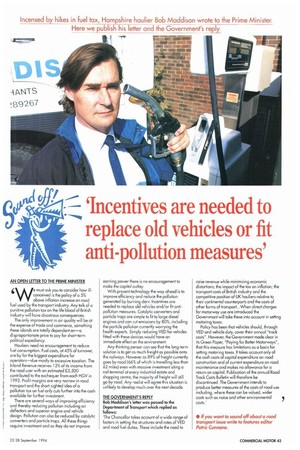'Incentives are needed to replace old vehicles or fit anti-pollution measures'
Page 45

If you've noticed an error in this article please click here to report it so we can fix it.
AN OPEN LETTER TO THE PRIME MINISTER
We must ask you to consider how ill
conceived is the policy of a5% above inflation increase on rood fuel used by the transport industry. Any talk of a punitive pollution tax on the life blood of British industry will have disastrous consequences. The only improvement in air quality will be at the expense of trade and commerce, something these islands are totally dependent on—a disproportionate price to pay for short-term political expediency.
Hauliers need no encouragement to reduce fuel consumption. Fuel costs, at 45% of turnover, are by far the biggest expenditure for operators—due mostly to excessive taxation. The Inland Revenue receives 12% of its income from the road user with an estimated £5,500 contributed to the exchequer from each HGV in 1993. Profit margins are very narrow in road transport and the short-sighted idea of a pollution tax on fuel only cuts further into the cash available for further investment.
There ore several ways of improving efficiency and thereby reducing pollution including air deflectors and superior engine and vehicle design. Pollution can also be reduced by catalytic converters and particle traps. All these things require investment ond as they do not improve earning power there is no encouragement to make the capital outlay.
With present technology the way ahead is to improve efficiency and reduce the pollution generated by burning derv. Incentives are needed to replace old vehicles and/or fit antipollution measures. Catalytic converters and particle traps are simple to fit to large diesel engines and can cut emissions by 80%, including the particle pollution currently worrying the health experts. Simply reducing VED for vehicles fitted with these devices would have an immediate effect on the environment.
Any thinking person can see that the long-term solution is to get as much freight as possible onto the railways. However as 89% of freight currently goes by road (66% of which is travelling less than 62 miles1 even with massive investment siting a rail terminal at every industrial estate and shopping centre, the majority of freight will still go by road. Any realist will agree this situation is unlikely to develop much over the next decade.
THE GOVERNMENT'S REPLY
Bob Maddison's letter was passed to the Department of Transport which replied as follows:
'The Chancellor takes account of a wide range of factors in setting the structures and rates of VED and road fuel duties. These include the need to raise revenue while minimising economic distortions; the impact of the tax on inflation; the transport costs of British industry and the competitive position of UK hauliers reiative to their continental counterparts and the costs of other forms of transport...When direct charges for motorway use are introduced the Government will take these into account in setting motoring taxes.
Policy has been that vehicles should, through • VED and vehicle duty, cover their annual "track costs", However, the Government made clear in its Green Paper, "Paying for Better Motorways', that this measure has limitations as a basis for setting motoring taxes. It takes account only of the cash costs of capital expenditure on road construction and of current expenditure on road maintenance and makes no allowance for a return on capital. Publication of the annual Road Track Costs Bulletin will therefore be discontinued. The Government intends to produce better measures of the costs of road use including, where these can be valued, wider costs such as noise and other environmental costs.'
• if you want to sound off about a road transport issue write to features editor Patric Cunnane.
























































































